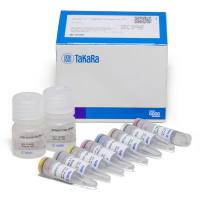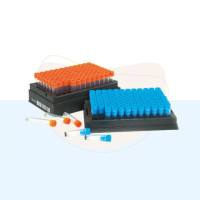Screening of Monoclonal Antibodies Using Antigens Labeled with Acetylcholinesterase
互联网
495
The production of large quantities of monoclonal antibodies (MAbs) of predetermined specificity has been rendered possible by the pioneering work of K�hler and Milstem (1 ) These workers have shown that lymphocytes can be immortalized and subsequently cultured after so1atic fusion with genetically selected myeloma cells. Usually, once fusion between spleen cells and myeloma cells has been performed, cells are suspended in a large volume of selective medium and distributed in culture wells, so that hybridomas are brought to clonal dilution If fusion is successful, the first hybridoma colonies will be detectable within a few days (5–15 d). Because fusion is a random process, most clones code for MAbs of unknown specificity, characterizing the immunological past of the host. It is then necessary to select the different colonies that secrete MAbs of the desired specificity. Owing to the great number of wells to be tested (often a few hundred), and to the small quantities of MAbs available (at best, 300 μL at a few μg/mL), it is not easy at this stage to characterize the fine specificity of the antibodies (i.e., recognition of a precise epitope, inhibitory effect on a biological system, properties suitable for purifying antigen, or for histochemical characterization, and so on). Initially, it is generally preferable to use a simple method to select all the hybridomas producing MAbs directed against the immunizing antigen. Further characterization of these MAbs is performed later, after expansion of the clones.









